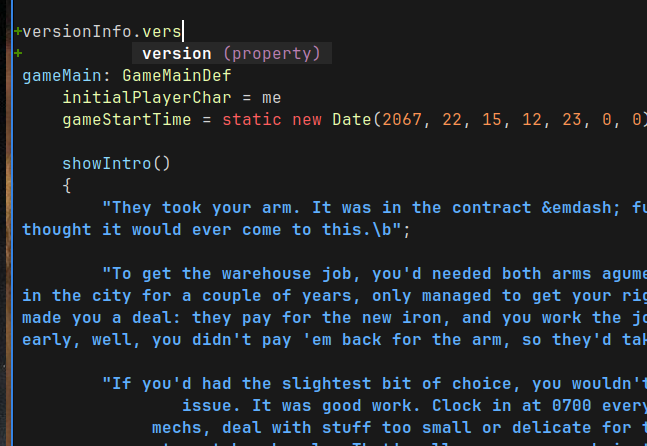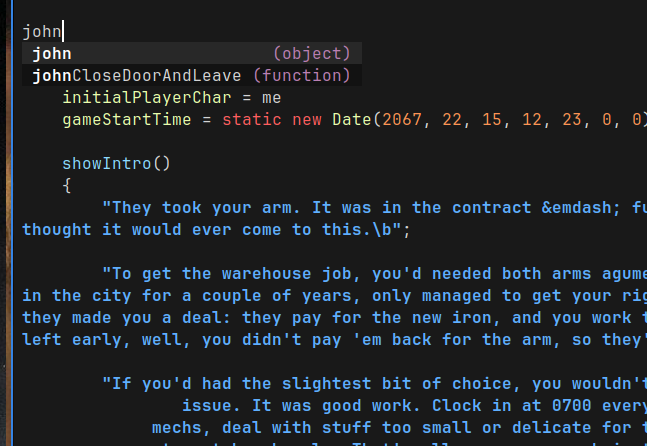This TADS 3 Emacs mode was modified by Alexis Purslane alexispurslane@pm.me from Brett Witty brettwitty@brettwitty.net's modification of Stephen Granade's tads2-mode.el to support TADS 3.
This version of the plugin requires Emacs 28.1 (the latest, currently) or later.
- syntax highlighting for properties when they're being accessed using dot notation
- syntax highlighting for properties and variables when they're being set
- syntax highlighting for function and method names when they're being called or defined
- different syntax highlighting for double-quoted description strings than regular single quoted strings
- syntax highlighting for substitutions inside strings (only inside the strings, too, using Emacs' anchored highlighters) and are a different font (italic sans serif)
- syntax highlighting for class names (just based on whether it's an identifier that starts with an uppercase letter)
- syntax highlighting for numbers
- Some updates to make it compatible with versions of Emacs since v24 (it was erroring out)
- Clearer specification of what something is in the imenu list of objects, functions, modifications, etc.
- Significantly updated code for modern Emacs Lisp/modern Emacs versions
- An in-editor build system that lets you compile the project the current file belongs to, even if the project root is in a parent directory, with a single key combination, and puts the output of the compiler in a split window where you can click on errors to jump to them in your code.
- In-editor running in your interpreter of choice
- Somewhat context-aware autocompletion generated from all of your project
files and the libraries listed in your
t3mbuild file whenever you save a new modification! - Crude jump-to-definition support with xrefs (it is very difficult to truly figure out where something was defined in TADS 3 because of how dynamic it is, but it works well for objects, classes, functions, just ends up being more of an occurence check for methods, sub-objects, and properties)
- Completion using
completion-at-point-functionsinstead of hard-coding a company-mode backend - Support for company-kinds (not limited to company mode), so you can have icons in your completion popup if you like that sort of thing
- Autocompletetion
- Compilation, Error-checking and jump-to-error
- Add source file to t3m
- Running the game in editor and refreshing it on build
- Jump to definition
- Running test scripts
- Spellcheck that knows how to deal with TADS text
- Word count that understands TADS text
- Strings viewer (the compiler can output all strings)
- Uploading the plugin to MELPA
- Refactoring tools
- Documentation for thing at point
- Multiline C-style comments like: /* This is a comment */ still have font-lock problems. Multiline font-locking is known to be difficult.
- In such comments, an apostrophe (') will try to match with something nonsense later on.
- You cannot move to sub-objects via tads-next-object.
- Emacs 29.1 or newer
- GNU Awk
Installation is simple. git clone this repository somewhere in your load path
(somewhere under ~/.emacs.d/) or add wherever you put it to your load path,
and then add this code to your configuration file (init.el, config.el under
DOOM, etc.):
(autoload 'tads3-mode "tads3" "TADS 3 editing mode." t)
(setq auto-mode-alist
(append (list (cons "\\.t$" 'tads3-mode))
auto-mode-alist))






